
Physical Review Fluids
metrics 2024
Unraveling Complexities in Fluid Flow
Introduction
Physical Review Fluids is an esteemed journal published by the American Physical Society, focusing on the intricate and essential field of fluid dynamics. With an impressive Q1 ranking in categories such as Computational Mechanics, Fluid Flow and Transfer Processes, and Modeling and Simulation, this journal serves as a pivotal resource for researchers and professionals seeking to disseminate high-quality and innovative research findings. The journal's scope encompasses a broad spectrum of topics within fluid mechanics, promoting advancements in theoretical, computational, and experimental methodologies. Although it is not an open-access journal, its publications are critically well-received, underpinned by its strong standing in the Scopus rankings which place it in the top percentiles across various relevant fields. Physical Review Fluids has been a foundational platform for scholars to share their discoveries from 2016 through 2024, making it an indispensable asset in the ongoing evolution of fluid dynamics research.
Metrics 2024
 1.07
1.07 2.50
2.50 2.70
2.70 56
56Metrics History
Rank 2024
Scopus
IF (Web Of Science)
JCI (Web Of Science)
Quartile History
Similar Journals
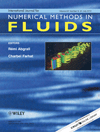
INTERNATIONAL JOURNAL FOR NUMERICAL METHODS IN FLUIDS
Transforming Fluid Flow Challenges into Numerical TriumphsINTERNATIONAL JOURNAL FOR NUMERICAL METHODS IN FLUIDS, published by Wiley, has established itself as a leading platform for cutting-edge research in the fields of applied mathematics, computational mechanics, computer science applications, and mechanical engineering. With its ISSN 0271-2091 and E-ISSN 1097-0363, this journal is committed to disseminating high-quality, peer-reviewed articles that contribute to the advancement of numerical methodologies in fluid dynamics. Boasting a commendable 2023 impact factor that places it in the second quartile across multiple relevant categories, it provides insights into significant research dimensions that engage an audience of researchers, professionals, and students keen on the computational challenges of fluid flow. The journal's broad scope encompasses foundational and applied research, encouraging the exploration of new numerical techniques and algorithms. As an invaluable resource based in the United Kingdom, INTERNATIONAL JOURNAL FOR NUMERICAL METHODS IN FLUIDS remains dedicated to providing insights and fostering innovation in its domain, with a consistent publication history spanning from 1981 to 2024.

RHEOLOGICA ACTA
Bridging Theory and Application in Material MechanicsRHEOLOGICA ACTA, established in 1958 and published by Springer, is a premier journal dedicated to advancing the understanding of rheological behavior in materials. With an impressive impact factor reflected in its Q2 rankings across multiple disciplines, including Condensed Matter Physics, Materials Science, and Mechanics of Materials, this journal serves as an essential resource for researchers, professionals, and students alike. As a key publication in its field, RHEOLOGICA ACTA disseminates high-quality research articles, reviews, and case studies that contribute to the understanding of complex fluid behavior and material properties. Though it operates under a subscription model, the depth and breadth of the content it provides ensures that it remains a vital part of the academic dialogue surrounding materials science and engineering. For those seeking to deepen their expertise, RHEOLOGICA ACTA is indispensable, fostering innovation and progress in the ever-evolving landscape of material characterization and application.

EXPERIMENTS IN FLUIDS
Elevating knowledge in fluid mechanics with impactful research.EXPERIMENTS IN FLUIDS is a prestigious journal in the field of fluid mechanics, published by SPRINGER, renowned for its rigorous peer-reviewed research and experimental studies that advance the understanding of fluid behavior in various contexts. With an ISSN number of 0723-4864 and an E-ISSN of 1432-1114, this journal has published influential works since its inception in 1983, maintaining a convergence of data and insights crucial for both academia and industry. Its impressive impact factor and ranking in the Q1 category for Computational Mechanics, Fluid Flow and Transfer Processes, Mechanics of Materials, and Physics and Astronomy underscore its significance in fostering high-quality research in these domains. Researchers and professionals benefit from the comprehensive access to experimental methodologies, innovative applications, and cutting-edge results that the journal provides without the Open Access model. The journal's offices located in New York, USA, facilitate its global outreach, making it an essential resource for scholars and practitioners seeking to deepen their expertise in fluid dynamics and related fields.

International Journal of Fluid Mechanics Research
Advancing Knowledge in Mechanical Engineering and PhysicsThe International Journal of Fluid Mechanics Research, published by BEGELL HOUSE INC, is a pivotal platform for the dissemination of innovative research within the fields of Mechanical Engineering and Physics. With a focus on the intricate dynamics of fluid behavior, this journal has been a cornerstone of scholarly communication since its inception in 1996, continuing to engage a global audience of researchers and professionals through to 2024. With a respectable Impact Factor reflecting its significant contributions to the disciplines—ranking in Q3 for both Mechanical Engineering and Miscellaneous Physics and Astronomy categories—this journal presents a unique opportunity for authors to share their findings in a peer-reviewed environment. Although it does not currently offer Open Access options, all published articles are carefully curated, ensuring high-quality research is accessible to its readership. As the journal navigates the complexities of fluid mechanics, it fosters an interdisciplinary dialogue, bridging theoretical frameworks with practical applications, thereby enhancing understanding and innovation in related fields.

Journal of Mathematical Fluid Mechanics
Pioneering Research in the Mathematical Foundations of Fluid BehaviorThe Journal of Mathematical Fluid Mechanics, published by SPRINGER BASEL AG, is a prestigious academic journal dedicated to the study of fluid dynamics through the lens of mathematics. With its ISSN 1422-6928 and E-ISSN 1422-6952, this journal has firmly established itself in the academic community since its inception in 2004, converging knowledge across various mathematical disciplines until 2024. Recognized in the top Q1 quartile rankings for Applied Mathematics, Computational Mathematics, Condensed Matter Physics, and Mathematical Physics as of 2023, it reflects a strong commitment to high-quality research and innovation. The journal features a variety of research articles, reviews, and theoretical frameworks, serving as an essential resource for researchers, professionals, and students eager to explore the mathematical principles underlying fluid mechanics. While it does not offer open access, the impact of its contributions resonates within interdisciplinary fields, advancing both theoretical insights and practical applications.

TRANSPORT IN POROUS MEDIA
Unraveling Complexities in Transport PhenomenaTRANSPORT IN POROUS MEDIA is a prominent peer-reviewed journal published by Springer, dedicated to advancing the understanding of fluid and energy transport processes in porous structures. With an ISSN of 0169-3913 and an E-ISSN of 1573-1634, this journal has established itself as a leading platform in the realms of chemical engineering and catalysis, achieving a ranking of Q2 in Chemical Engineering and Q3 in Catalysis as of 2023. The journal encompasses a wide scope, covering theoretical, experimental, and applied research that explores the complexities of porous media transport phenomena, thus catering to a diverse audience of researchers, professionals, and students in related fields. Although open access options are not offered, TRANSPORT IN POROUS MEDIA remains an excellent resource for those seeking to stay at the forefront of advancements and challenges in porous media transport. With a publication history dating back to 1986 and ongoing contributions expected until 2024, this journal continues to play a crucial role in fostering knowledge and innovation within the discipline.
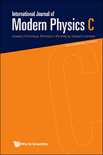
INTERNATIONAL JOURNAL OF MODERN PHYSICS C
Fostering Global Dialogue in Computational TheoryINTERNATIONAL JOURNAL OF MODERN PHYSICS C, published by WORLD SCIENTIFIC PUBL CO PTE LTD, is a pivotal platform for disseminating groundbreaking research in the fields of computational theory, mathematical physics, and statistical physics. With an ISSN of 0129-1831 and an E-ISSN of 1793-6586, this esteemed journal, based in Singapore, serves a global audience of researchers and professionals who are dedicated to pushing the boundaries of knowledge in modern physics. The journal's rigorous selection process ensures the inclusion of high-quality articles that advance the understanding and application of complex theoretical concepts. Currently, the journal holds a commendable Q3 quartile ranking across several categories, including Computational Theory and Mathematics and Statistical and Nonlinear Physics, reflecting its influence and relevance in the academic community. Covering a wide array of topics from 1996 to 2024, the INTERNATIONAL JOURNAL OF MODERN PHYSICS C is not just a repository of research; it is a critical resource for students and scholars aiming to stay at the forefront of modern scientific inquiry.
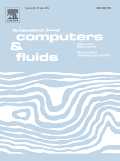
COMPUTERS & FLUIDS
Pioneering Research at the Intersection of Technology and Fluid MechanicsCOMPUTERS & FLUIDS, published by PERGAMON-ELSEVIER SCIENCE LTD, is a premier journal in the fields of Computer Science and Engineering, with a distinguished history dating back to 1973. Its Q1 ranking in both Computer Science (Miscellaneous) and Engineering (Miscellaneous) illustrates its high impact and relevance, being positioned among the top tier of scientific publications. With a robust focus on the intersection of computational methods and fluid dynamics, this journal serves as a vital platform for researchers, professionals, and students dedicated to advancing knowledge and technology within these domains. Although it is not an open-access journal, its articles are accessible through various academic institutions and libraries, ensuring that vital research reaches its intended audience. Readers can explore innovative methodologies and applications, reinforcing the journal's commitment to enhancing the understanding of fluid mechanics through cutting-edge computational approaches. For more details, visit the official website of COMPUTERS & FLUIDS to stay abreast of the latest research advancements.
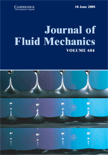
JOURNAL OF FLUID MECHANICS
Exploring the depths of fluid phenomena.JOURNAL OF FLUID MECHANICS, published by Cambridge University Press, is a premier international journal recognized for its significant contributions to the field of fluid dynamics. With an esteemed impact factor that places it in the Q1 category across multiple disciplines, including Applied Mathematics, Condensed Matter Physics, Mechanical Engineering, and Mechanics of Materials, this journal serves as a vital resource for researchers and practitioners alike. Established in 1956, it provides a platform for innovative and high-quality research articles that advance the understanding of fluid mechanics phenomena. The journal's rankings underscore its prestige, with Scopus recognizing it among the top journals in its category. Although it currently does not offer open access, the journal remains accessible to educational institutions and professionals in the United Kingdom and beyond. By addressing critical and emerging topics in fluid mechanics, JOURNAL OF FLUID MECHANICS is essential for those striving to push the boundaries of knowledge and application in this dynamic field.
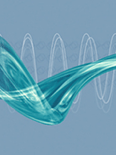
Annual Review of Fluid Mechanics
Advancing the Frontiers of Fluid DynamicsThe Annual Review of Fluid Mechanics, published by Annual Reviews, is a premier journal in the field of fluid mechanics, dedicated to advancing our understanding of fluid behavior through comprehensive and critical reviews of contemporary research. With an impressive impact factor that reflects its stature—ranking Q1 in Condensed Matter Physics and positioned 4th out of 434 in Scopus’s Physics and Astronomy category—it stands as a vital resource for researchers, professionals, and students alike. Since its inception in 1970, the journal has provided vital insights and synthesized knowledge that drive innovations and applications across various scientific disciplines. Although it does not offer open access, the journal ensures rigorous editorial standards and captivating content that contributes meaningfully to the academic discourse in fluid dynamics. Published annually, the Annual Review of Fluid Mechanics continues to be a cornerstone for anyone interested in the complexities of fluid movement and its implications in both theoretical and practical contexts.